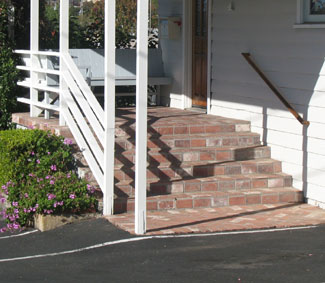Brick Stairs

Problems With Brick Stairways
1. Brick stairways can be slippery when wet, depending upon which type
of brick you use for your stair treads and landing. If you're planning
on building one of these staircases, on the outside of your home, try to
avoid using smooth or glossy bricks that could create safety problems.
2. These stairways can crack, if the foundation wasn't built correctly
or if they weren't installed properly. I've seen situations where an
entire stair step actually cracked right off the staircase, creating a
trip hazard.
Benefits For Building Brick Staircases
1. The best thing I could possibly think of is the fact that they look wonderful. I've seen some amazing staircases built out of a variety of different bricks.Every once in awhile I come across a project where someone applied bricks over their existing concrete or even wooden stairway. Most wood stairways can't take the additional weight and eventually could fail.
Covering Your Existing Concrete Stairs
If you're planning on covering your existing concrete porch, deck or patio steps, with brick, there's a few things that you should familiarize yourself with.1. How thick are the bricks going to be and will they work with the existing stairway, sidewalk, deck, porch or flooring? Try to avoid creating excessive riser variations. By adding a 2 1/2 inch brick to the top of your first stair step, without adding a 2 1/2 inch brick to the bottom flooring or sidewalk, will create a stair riser that's disproportionately larger, than the others.
2. Is the existing structure strong enough to carry the additional weight?
3. Are there any cracks in the existing structure that will create problems in the future. If you have small cracks that are getting progressively larger, those cracks could transfer into your new brick and end up cracking them, in the long run.


